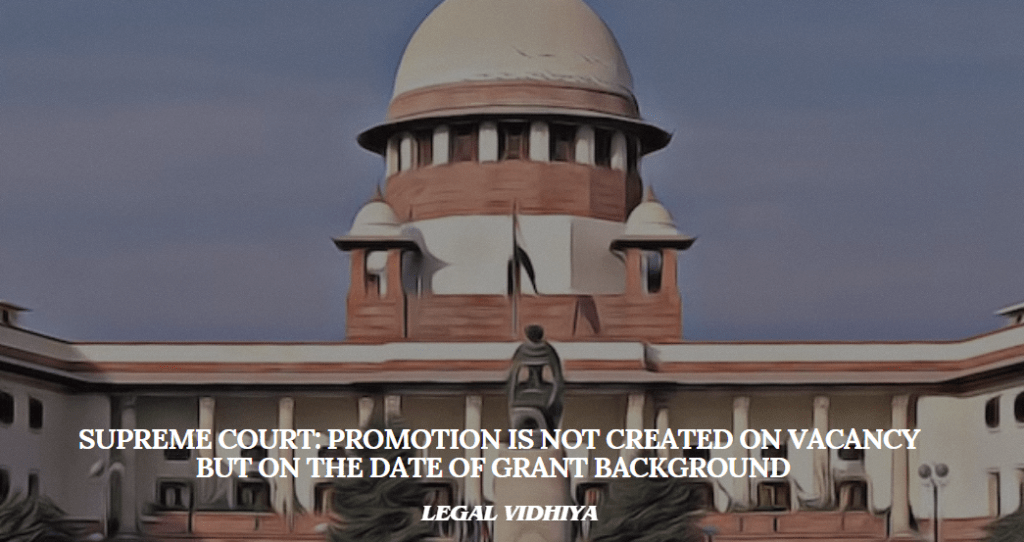
• The Bihar State Electricity Board filed an appeal against an employee who sought a retroactive promotion, and the Supreme Court recently reaffirmed that a promotion takes effect from the date it is granted, not from the creation of the post or the date there is a vacancy on it.
• While it is true that courts have viewed the right to be considered for promotion as both a statutory and fundamental right, there is no fundamental right to promotion per se. Even in the event that the subject posts were vacant, this would not have given the respondent the right to retroactively claim promotion to a higher position. The respondent was only given the advantage of an accelerated promotion when a genuine vacancy occurred, and even then, only after following the required procedure, the bench of Justices Hima Kohli and Ahsanuddin Amanullah noted.
• The respondent-employee was not denied a promotion to a higher position in this case, according to the Court, nor could it be claimed that the appellant-employer’s actions were motivated by any wrongdoing or improper use of authority. Instead, the employer-Board’s actions were solely motivated by administrative needs. As a result, the High Court’s decision against the Board was overturned by the Court, who also granted the appeal.
• The appellant-Board hired the physically challenged respondent, a member of the Scheduled Caste, for the position of Lower Division Assistant in 1976. He received several promotions during the years. A resolution establishing the Kal Awadhi for applicants from Scheduled Caste/Scheduled Tribe and General Category to be promoted from one grade to another for different employee categories was passed by the Board on December 26, 1991.
Facts
• The responder received an expedited promotion to the position of Under Secretary in 1995. He received an expedited promotion to the position of Joint Secretary eight years later via Notice dated March 5, 2003. Nonetheless, the Board resolved in December 2003 to cut the number of Joint Secretary positions authorized at its Patna headquarters from six to three. This was allegedly due to the split of the former State of Bihar into the current State of Bihar and as well as Jharkhand
• The respondent filed a writ petition before the Patna High Court on March 5, 2003, expressing their dissatisfaction with the notification. Even though he was elevated to the position of Joint Secretary on March 5, 2003, he claimed that the promotion should have been taken into account in July 1997, when the position had truly become vacant. The learned Single Judge rejected this plea.
• The respondent then filed an intra-court appeal, which was granted. With effect from July 29, 1997, the appellant was ordered by the High Court to promote the respondent to the position of Joint Secretary. The appellant-Board was instructed to give the respondent any
benefits that would have accrued to him on such a post with retroactive effect because he had already retired by the time the verdict was issued. The appellant-Board petitioned the Supreme Court in opposition to the ruling of the High Court.
• The appellant-Board contended that, as of July 29, 1997, the day the respondent finished his Kal Awadhi for promotion from Under Secretary to Joint Secretary, there had been no opening for the Joint Secretary position until March 5, 2003, the actual date of his promotion. Additionally, it was maintained that the Kal Awadhi requirements were merely an eligibility requirement that, if fulfilled, made the incumbent employee eligible to be considered for a promotion; an early promotion was not required.
• Conversely, the respondent asserted that, as of July 29, 1997, he had finished the Kal Awadhi in accordance with the Board’s resolution from December 26, 1991. He also emphasized that, on the pertinent date, July 29, 1997, he was the most senior member of the Under Secretary cadre, that he was physically handicapped, and that he belonged to the reserved group.
Judgement
• The Court concluded that, subject to meeting eligibility requirements and relevant regulations, the right to be given consideration for promotion is a component of “equality of opportunity” after reviewing prior legal decisions on the matter.
• “A right to be considered for promotion being a facet of the right to equal opportunity in employment and appointment, would have to be treated as a fundamental right guaranteed under Articles 14 and 16(1) of the Constitution of India, but such a right cannot translate into a vested right of the employee for being necessarily promoted to the promotional post, unless the rules expressly provide for such a situation,” the statement stated, drawing a distinction between the stages of considering an employee for promotion and that of recognizing the said right as a vested right for promotion.
• The respondent claimed that upon completing the Kal Awadhi, he would be eligible for promotion immediately. However, the court rejected this argument.
• Regarding the circumstances, the court observed that the respondent received five promotions from the appellant-Board in a period of ten years and five months.
Bihar State Electricity Board and Others v. Dharamdeo Das, CIVIL APPEAL NO. 6977 OF 2015 2024 LiveLaw (SC) 506
Aishwarya, B. A. L. Lb. (Hons), Mody University Of Science And Technology, Laxmangarh, intern at legal vidhiya
Disclaimer: The materials provided herein are intended solely for informational purposes. Accessing or using the site or the materials does not establish an attorney-client relationship. The information presented on this site is not to be construed as legal or professional advice, and it should not be relied upon for such purposes or used as a substitute for advice from a licensed attorney in your state. Additionally, the viewpoint presented by the author is of a personal nature.




0 Comments